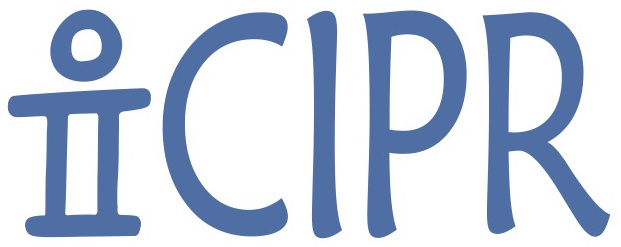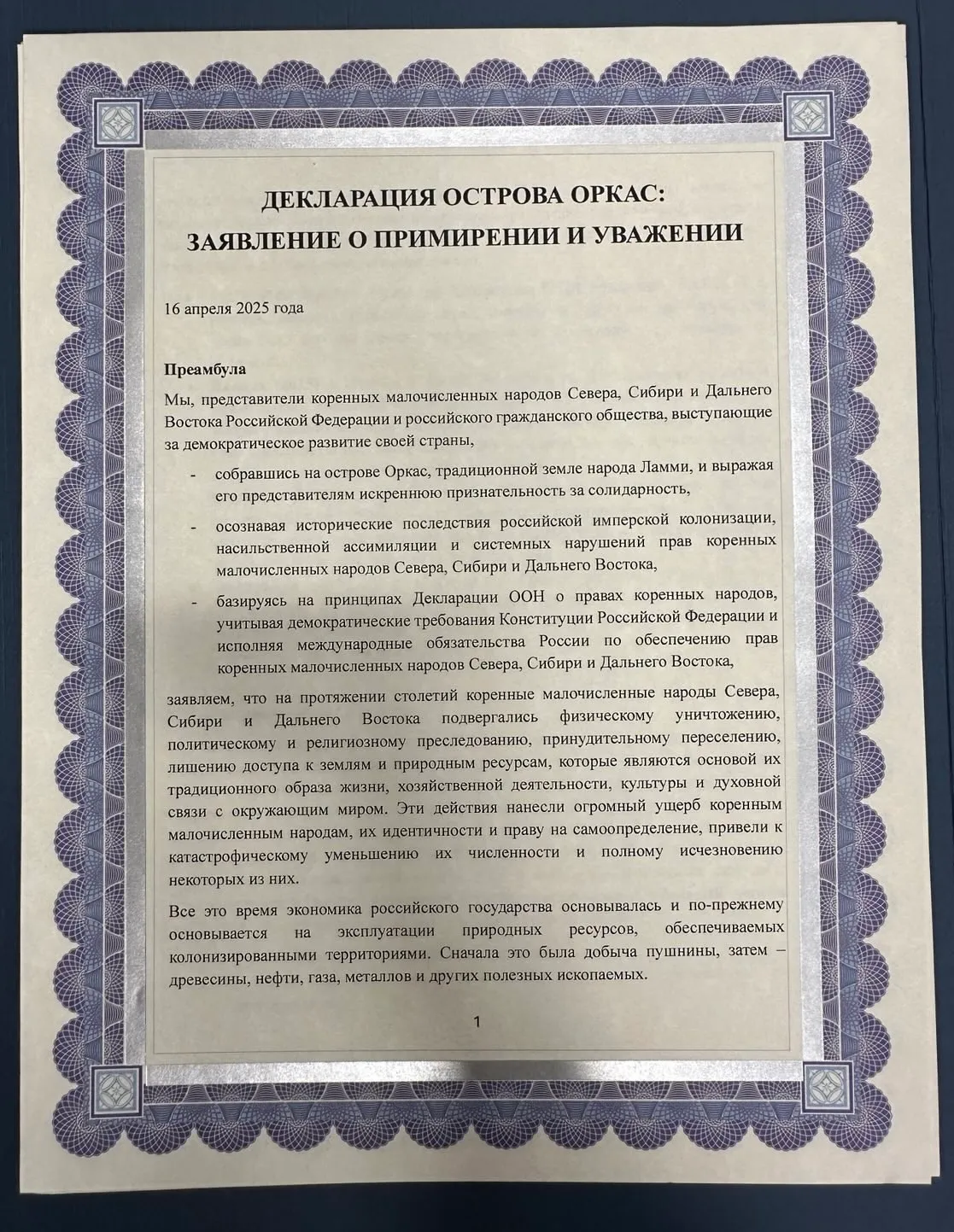April 16, 2025
Preamble
We, representatives of the Indigenous Small-Numbered Peoples of the North, Siberia, and the Far East of the Russian Federation, together with representatives of Russian civil society advocating for the democratic development of our country,
- Having convened on Orcas Island, the traditional territory of the Lummi Nation, and expressing our deep gratitude to its people for their solidarity;
- Recognizing the historical consequences of Russian imperial colonization, forced assimilation, and systemic violations of the rights of Indigenous Small-Numbered Peoples of the North, Siberia, and the Far East;
- Guided by the principles of the United Nations Declaration on the Rights of Indigenous Peoples, the democratic provisions of the Constitution of the Russian Federation, and Russia’s international obligations to uphold the rights of Indigenous Small-Numbered Peoples of the North, Siberia, and the Far East;
We affirm that for centuries, the Indigenous Small-Numbered Peoples of the North, Siberia, and the Far East have been subjected to physical extermination, political and religious persecution, forced displacement, and the deprivation of access to their ancestral lands and natural resources — which constitute the foundation of their traditional way of life, economic activity, culture, and spiritual connection to the natural world. These actions have caused immense harm to Indigenous peoples, their identities, and their right to self-determination, resulting in a catastrophic decline in their populations and, in some cases, the complete disappearance of entire communities.
Throughout this period, the Russian state’s economy has relied — and continues to rely — on the exploitation of natural resources extracted from colonized territories: first through the fur trade, and later through the extraction of timber, oil, gas, metals, and other minerals.
We recognize that similar processes of colonization and assimilation have affected Indigenous peoples in many parts of the world. However, we also note that a number of democratic countries have taken important steps to acknowledge historical injustices and to restore justice.
- United States (2009–2010) – Adoption by the U.S. Congress of Senate Joint Resolution 14 (S.J.Res.14), which offered a formal apology to Native American peoples for violations of treaties, forced relocations, and the destruction of their cultural traditions.
- Canada (2015) – Final report of the Truth and Reconciliation Commission, established in 2008 as part of the Indian Residential Schools Settlement Agreement (IRSSA). The report includes 94 Calls to Action aimed at restoring Indigenous rights, including recognition of the cultural genocide committed against Indigenous peoples.
- Norway (2023) – Report of the National Truth and Reconciliation Commission (Sannhet og forsoning), confirming the policy of Norwegianization toward the Sámi, Kvens, and Forest Finns, and offering proposals for recognition and reparations.
- Australia (1991–2023) – Establishment of the Council for Aboriginal Reconciliation, the launch of the independent organization Reconciliation Australia, and the development of the Uluru Statement from the Heart (2017), which calls for constitutional recognition of Indigenous rights.
1. Recognition of Historical Injustices
We insist on the recognition that Russia, like other European empires, historically pursued a policy of conquest and colonization of new territories, deriving significant economic benefits from this process.
The Russian Empire, followed by the Soviet Union and the modern Russian Federation, exploited these territories for the extraction of natural resources and economic gain, while disregarding the rights of Indigenous Small-Numbered Peoples. Although government institutions of the Russian Empire, the USSR, and contemporary Russia have proclaimed a special relationship with Indigenous Small-Numbered Peoples and have undertaken certain efforts aimed at their preservation and development, in practice this has largely taken the form of a paternalistic policy — one which has included and continues to include:
- The dispossession of Indigenous Small-Numbered Peoples of their ancestral lands;
- Repression of Indigenous leaders and suppression of Indigenous self-governance;
- The imposition of a coercive and mandatory system of boarding schools, which led to the destruction of family and cultural ties, forced assimilation, erosion of Indigenous identity, and the loss of native languages and traditions (commonly referred to as the issue of the “Stolen Generations”);
- Economic exploitation of Indigenous territories without the Free, Prior, and Informed consent of the affected communities, and without regard for their interests or the impacts on their traditional way of life;
- Disregard for international obligations concerning the protection of Indigenous rights, despite Article 69 of the current Constitution of the Russian Federation, which guarantees the rights of Indigenous Small-Numbered Peoples in accordance with universally recognized principles and norms of international law and with international treaties to which the Russian Federation is a party.
2. A Common Path Toward Reconciliation
Today, the Russian Federation is governed by the authoritarian regime of President Putin, which continues to pursue colonial policies both within the country and beyond its borders. Aggressive military actions, including the full-scale invasion of Ukraine, demonstrate a rejection of international legal principles and a further intensification of expansionist policies.
We affirm that reconciliation and respect are not limited to acknowledging past injustices but are essential conditions for building a shared and just future based on equality, historical justice, and the norms of international law.
We express our readiness to work in partnership with democratic forces, civil society, and international allies in pursuit of these necessary changes. We believe that the political system of a post-imperial Russia must be aligned with the principles of international law that guarantee the rights of Indigenous peoples to self-determination, to traditional lands and resources, and to cultural development, as articulated in the United Nations Declaration on the Rights of Indigenous Peoples.
As representatives of the Indigenous Small-Numbered Peoples of the North, Siberia, and the Far East, we recognize that, due to the demographic scale and dispersed nature of our communities, the path to self-determination does not entail the establishment of independent states within the territory of the current Russian Federation. Accordingly, we see it as essential to join our efforts with democratic opposition movements and organizations within Russia to resist the existing regime. At the same time, we respectfully acknowledge that other peoples may seek to realize their rights and political aspirations in different forms. We call on all parties to engage in dialogue aimed at peaceful resolution of political issues and to reject violence as a means of political struggle.
We hereby announce the establishment of a permanent platform for dialogue between representatives of the Indigenous Small-Numbered Peoples of the North, Siberia, and the Far East, and Russian civil society. As initial steps, we are ready to undertake the following actions:
- Conduct continuous monitoring of violations of the rights of Indigenous Small-Numbered Peoples of the North, Siberia, and the Far East, and provide assistance in defending these rights. The results of such monitoring will be shared with the United Nations, other international organizations, and relevant stakeholders.
- Coordinate academic, educational, and expert efforts aimed at analyzing the consequences of colonial policies, restoring historical memory, and researching issues affecting Indigenous Small-Numbered Peoples of the North, Siberia, and the Far East.
- Develop legislative initiatives and legal proposals aimed at restoring the rights of Indigenous Small-Numbered Peoples of the North, Siberia, and the Far East.
- Engage a broad range of participants from among Indigenous representatives, Russian civil society, scholars, policymakers, human rights defenders, activists, and journalists in dialogue. This includes organizing meetings, consultations, and other events to promote reconciliation and the restoration of justice.
We entrust the International Indigenous Fund for Development and Solidarity “Batani” with the coordination of this platform’s activities.
We call on all democratic forces in Russia, representatives of civil society, international organizations, and Indigenous communities around the world to support this process and to participate in shaping a future based on the principles articulated in this Declaration.
Upon the establishment of democracy in Russia, we will seek the implementation of the following steps necessary for the recognition of the rights of Indigenous Small-Numbered Peoples:
- The establishment of a parliamentary commission to investigate violations of the rights of Indigenous peoples, regardless of the statute of limitations.
- The preparation of a national report on colonization and violations of the rights of Indigenous Small-Numbered Peoples, modeled after similar documents produced in Canada, Norway, and Australia.
- The creation of an independent body to review and address claims made by Indigenous peoples concerning land and cultural rights.
- The adoption of legislation recognizing the rights of Indigenous Small-Numbered Peoples to their ancestral lands and natural resources.
The participants express their readiness for cooperation and sustained efforts to advance the goals of reconciliation, the recognition of historical justice, and the protection of the rights of the Indigenous Small-Numbered Peoples of the North, Siberia, and the Far East.
Signatories:
- Dmitry Berezhkov, Itelmen, editor of Indigenous Russia (remote)
- Grigory Vaipan, lawyer
- Dmitry Valuyev, President of Russian America for Democracy in Russia
- Nadezhda Valuyeva, Coordinator of Russian America for Democracy in Russia
- Maria Vyushkova, researcher, expert with the International Indigenous Fund for Development and Solidarity “Batani”
- Alexandra Garmazhapova, civic leader, head of the Free Buryatia Foundation
- Andrey Danilov, Saami, International Committee of Indigenous Peoples of Russia (remote)
- Tian Zaochnaya, International Committee of Indigenous Peoples of Russia
- Mark Zdor, Chukchi, International Committee of Indigenous Peoples of Russia
- Vladislav Inozemtsev, co-founder of the European Center for Analysis and Strategies (CASE-Center)
- Elena Kostyuchenko, journalist
- Stefania Kulaeva, Anti-Discrimination Centre “Memorial” (remote)
- Elena Lukyanova, Professor at the Free University, Doctor of Law, member of the Anti-War Committee of Russia
- Andrey Pivovarov, politician
- Lyubov Sobol, Russian politician
- Pavel Sulyandziga, Udege, International Indigenous Fund for Development and Solidarity “Batani”
- Pavel Sulyandziga Jr., Udege, International Indigenous Fund for Development and Solidarity “Batani”
- Evgeny Suprun, civil activist
- Evgenia Chirikova, coordinator of the media project Activatica.org (remote)
- [Signature withheld for the safety of the signatory]
- [Signature withheld for the safety of the signatory]
- [Signature withheld for the safety of the signatory]
- [Signature withheld for the safety of the signatory]
- [Signature withheld for the safety of the signatory]
- [Signature withheld for the safety of the signatory]
- [Signature withheld for the safety of the signatory]
- [Signature withheld for the safety of the signatory]

